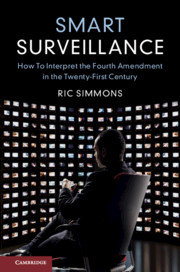Book contents
- Smart Surveillance
- Smart Surveillance
- Copyright page
- Contents
- Acknowledgments
- Introduction
- 1 The Cost–Benefit Analysis Theory
- 2 Measuring the Benefits of Surveillance
- 3 Quantifying Criminal Procedure
- 4 Reactive Surveillance
- 5 Binary Searches and the Potential for 100 Percent Enforcement
- 6 Public Surveillance, Big Data, and Mosaic Searches
- 7 The Third-Party Doctrine Dilemma and the Outsourcing of Our Fourth Amendment Rights
- 8 Hyper-Intrusive Searches
- Conclusion
- Notes
- Index
6 - Public Surveillance, Big Data, and Mosaic Searches
Published online by Cambridge University Press: 02 August 2019
- Smart Surveillance
- Smart Surveillance
- Copyright page
- Contents
- Acknowledgments
- Introduction
- 1 The Cost–Benefit Analysis Theory
- 2 Measuring the Benefits of Surveillance
- 3 Quantifying Criminal Procedure
- 4 Reactive Surveillance
- 5 Binary Searches and the Potential for 100 Percent Enforcement
- 6 Public Surveillance, Big Data, and Mosaic Searches
- 7 The Third-Party Doctrine Dilemma and the Outsourcing of Our Fourth Amendment Rights
- 8 Hyper-Intrusive Searches
- Conclusion
- Notes
- Index
Summary
Chapter 6 examines mosaic searches, and discusses the potential and challenges created by big data surveillance. Recent developments in surveillance technology allow police to engage in various methods of widespread, low-cost surveillance, from tracking a person’s location through her cell phone to predicting behavior based on a person’s telephone records, credit card purchases, and other publicly available details. These data points will only become more numerous in the near future, as camera-mounted drones and self-driving cars become common. Courts and legislatures have been wary of these developments, and in fact have sought to restrict them because their financial cost is so low that they allow law enforcement to engage in nearly indiscriminate surveillance. But the cost–benefit analysis theory shows that courts should adopt the opposite approach: all other factors being equal, a surveillance method that is less expensive should be encouraged, not restricted. Furthermore, encouraging low cost widespread surveillance will help to even out the massive inequities we now see in government surveillance, where the poor and people of color bear a much greater cost than more enfranchised citizens. Finally, applying the cost–benefit analysis theory will require the government to demonstrate the benefits of indiscriminate surveillance, which will encourage the government to develop and utilize more productive (and less intrusive) methods of surveillance.
- Type
- Chapter
- Information
- Smart SurveillanceHow to Interpret the Fourth Amendment in the Twenty-First Century, pp. 119 - 140Publisher: Cambridge University PressPrint publication year: 2019



